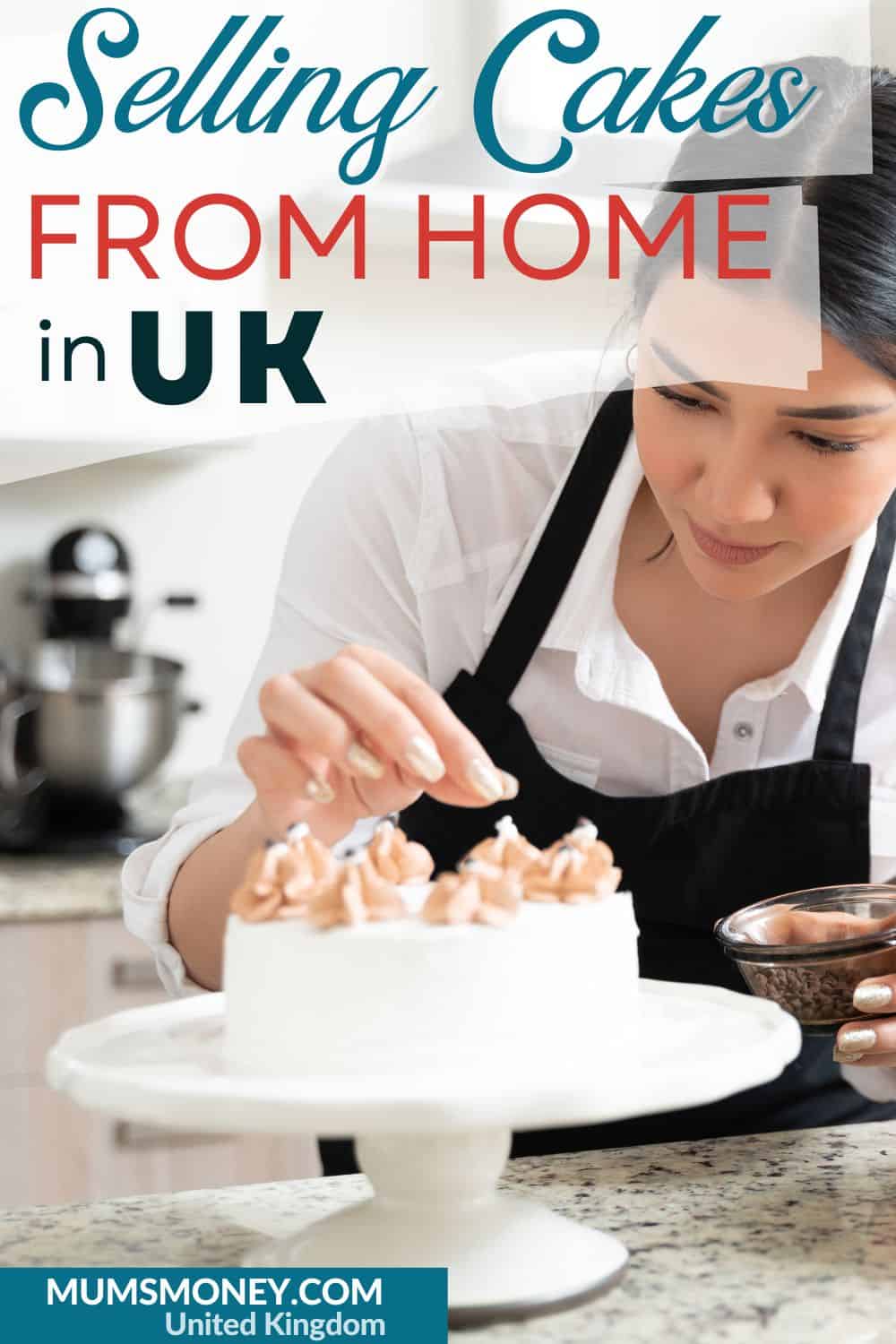If you belong to any local social media groups – such as Facebook groups for your local community – then you’ve probably seen requests for cake makers pop up there. More than once.
With the explosion of home baking here – thanks in part to the popularity of the Great British Bake Off – demand for high-quality, photogenic baked goods has never been so high.
If you like to put on an apron before whipping up a delectable baked treat or two, then you might well have wondered whether you could make a living from starting a home baking business.
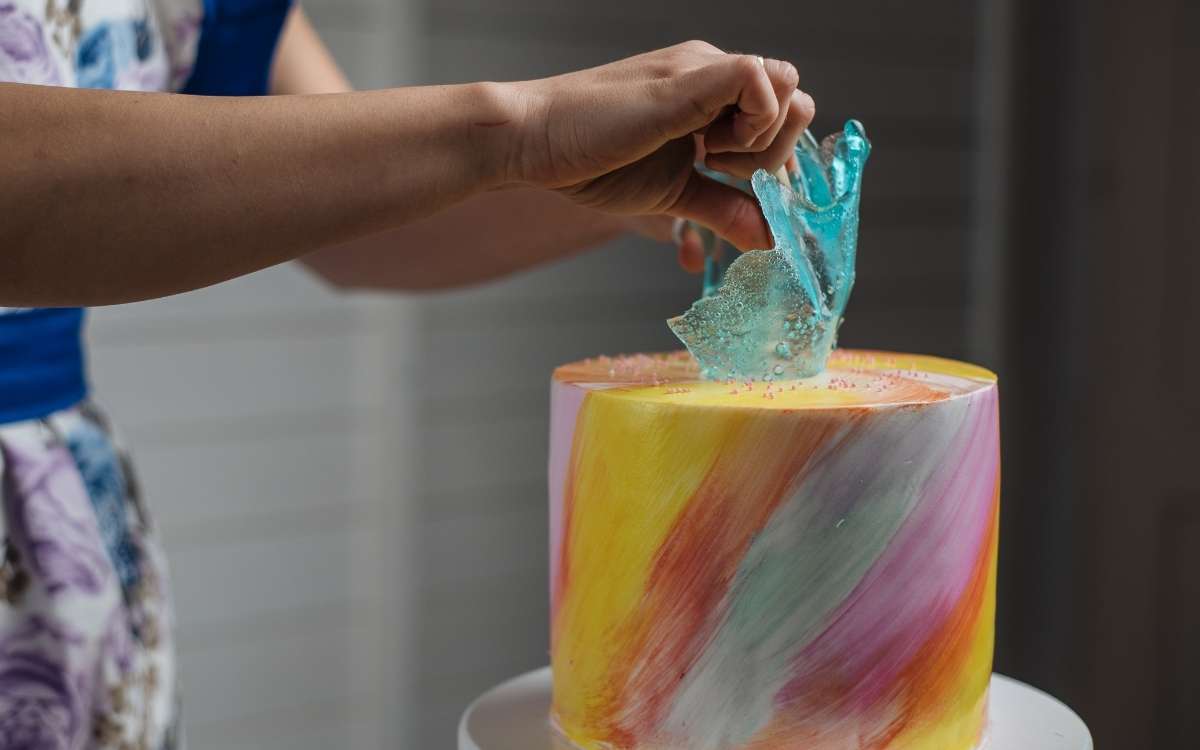
With kids’ birthdays, special occasion parties, corporate events, and even weddings to cater to, running a food business can be immensely satisfying. It can also be very rewarding in financial terms.
But there’s more to it than creating a cake that looks pretty and tastes delicious. What about food safety? Do you need to pay tax?
Where might HMRC, your local authority, or the food standards agency come into things? Can you use your own kitchen? How about pest control?
If you’re considering making corporate, birthday, party, or wedding cakes for profit, then you need to read this post. Covered here is all you need to know about starting your very own home baking business.
From whether you need a food hygiene certificate and register as a sole trader to what type of cakes you could sell, this article outlines it all.
Here are 13 (yep, a baker’s dozen) of the steps to follow.
Contents
- Setting up a Home Baking Business – 13 Simple Steps
- 1. Do the Rules Apply to You?
- 2. Prepare Your Kitchen
- 3. Get a Food Hygiene Certificate
- 4. Tell Your Local Authority
- 5. Learn About Allergens and Food Labelling
- 6. Expect a Visit From the Environmental Health Service
- 7. Make a HACCP Plan
- 8. Register With HMRC
- 9. Think About Delivery
- 10. Consider Insurance Cover
- 11. Determine Your Niche
- 12. Inform Your Mortgage Lender or Landlord
- 13. Establish a Local Presence
- Selling Cakes From Home – FAQs
- A Home Food Business – Final Thoughts
Setting up a Home Baking Business – 13 Simple Steps
First, let’s take a look at the legal side of starting a food business from home in the UK. This is what food businesses need to do before selling cakes on a self-employed basis.
1. Do the Rules Apply to You?
Selling Cakes Occasionally
There may be no point in following all these stringent standards and rules if you don’t have to.
When you’re making a batch of cakes for the local summer fair, a fundraising charity event, or a school bake sale, then there’s no need to tick all of these boxes.
You should always think about food hygiene and those with allergies, though, as not doing so could negatively impact other people.
A Cake Business
If you want to sell cakes to other local businesses – such as a café, farm, or gift shop – then you will need to comply with all the regulations. The same applies if you want to sell your goods via social media.
2. Prepare Your Kitchen
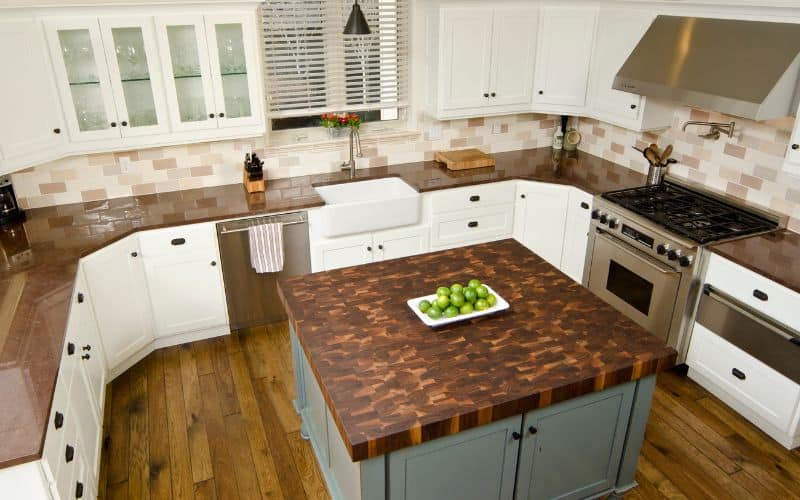
You need to think about where to store ingredients and how to ensure your kitchen is safe to work in before getting started. Where will goods be stored? Where will you work?
Don’t worry – your kitchen isn’t expected to be up to the standard of a restaurant or larger-scale food business. These are some of the factors the Food Standard Agency takes into consideration.
Walls and Floors
Your walls and flooring should be in good condition. That means they should be well maintained and in a decent state of repair. They should also be disinfected regularly.
Windows and Doors
Windows and doors should not allow for the build-up of dirt and should be simple to keep clean. They should also be disinfected regularly.
Removable insect screens should also be fitted to doors and windows to keep out contaminants.
Ceilings
The ceiling above your workspace must also be well-kept, with no flaking plaster or paint. There should be no mold or condensation build-up, and it should be kept clean.
Cleaning Food and Equipment
You also need to be able to wash food as required, clean your equipment and wash your hands. A hot and cold water supply is necessary, as is a sink.
You should have a separate washbasin for hand washing. A downstairs WC that’s nearby should be sufficient.
Storing Food and Equipment
Food and equipment storage is also needed. All equipment and cleaning areas should be kept clean, and should also be disinfected on a regular basis.
3. Get a Food Hygiene Certificate
If you want to set up a home-based food business, then you’re going to need to get a food hygiene certificate. The good news is that this can all be done via online courses, and these are inexpensive.
Food Hygiene Level 1
The more basic level 1 course is aimed at those who may work around food but who are not directly involved in its preparation. A level 2 Food Hygiene and Safety certificate is thus recommended.
Food Hygiene Level 2
There are several versions of the level 2 course. The Catering version is more appropriate than the Retail or Manufacturing ones for a home baking business.
As well as instruction in good food hygiene, the courses help ensure compliance with UK and EU food law when operating your cake-making business.
As well as those running a baking business from home, the level 2 Catering course is also suitable for those with food trucks or stalls or who run a more general catering business.
Food Hygiene Level 3
The level 3 food hygiene course is aimed at those working in a supervisory capacity. If your business grows in the future and you need to move premises or employ people, then it may be worth considering this course.
4. Tell Your Local Authority
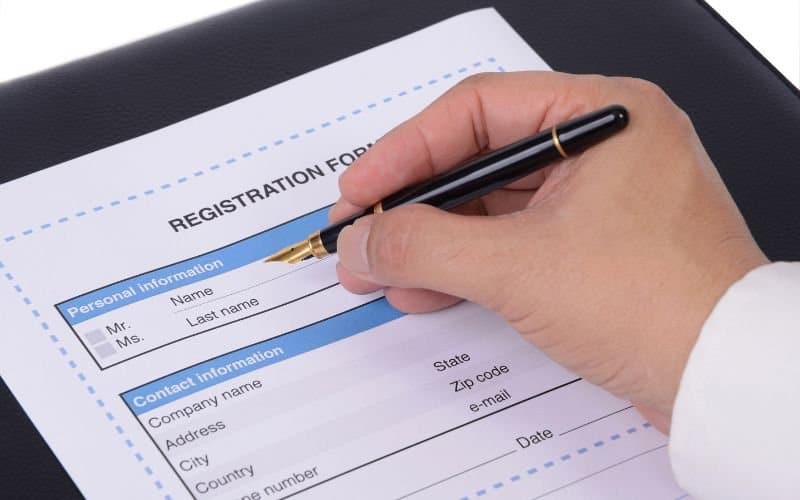
Your business should be registered with the local authority for your area. This is to protect the public – and you.
If you sell cakes to the public and someone reports you for doing so, you could get into trouble by failing to register this with your local authority. It’s actually the premises you’ll be using that they’re most interested in.
Registration should be completed 28 days or more before you start trading. If you’ve already commenced, do make sure you register as soon as possible.
The good news is that it’s free to register with your local authority. They are also unable to refuse your registration but will send someone out to inspect the premises.
5. Learn About Allergens and Food Labelling
The Food Standards Agency provides free online training courses which you should complete. These include labeling and food allergy training.
6. Expect a Visit From the Environmental Health Service
It’s not only food hygiene training you need to prepare for. When you’re setting up a baking business from home, you should expect the local environmental health officer to pay a visit.
This is, again, in the interests of the public, and to ensure their health and safety when buying your edible goods.
Having a current Food Hygiene Certificate helps to show the environmental health service that you understand the principles and applications of food safety.
7. Make a HACCP Plan
Another necessary step in starting your home baking business is to make a HACCP plan. The acronym stands for Hazard Analysis and Critical Control Point, and your plan should adhere to the principles of this.
The concept centres on freedom from chemical, biological and physical threats to food safety. Critical Control Points (CCPs) are the measure used to identify, prevent, reduce and remove any such hazards.
CCPs must be monitored and any appropriate action should be taken promptly. You’ll need to undertake regular checks and keep records of doing so.
HACCP training courses are also available online. These can help you to understand not only what you need to do, but also why this matters.
8. Register With HMRC
Food safety aside, you’ll also be liable for tax on any income generated by your cake business. This means you must register as self-employed with HMRC.
Assuming you’re running the business alone, the simplest way is to register as a sole trader. You’ll then need to complete a Self Assessment tax return each financial year, as well as pay any monies owing to HMRC.
Don’t be daunted – this is fairly easy to do, and HMRC provides plenty of guides to ensure you fill out the forms correctly.
To ensure you’re covered by the law – and can fill in your return accurately – you must keep clear, up-to-date records of all income and expenditure.
You don’t have to have a business bank account to set up as a sole trader.
9. Think About Delivery
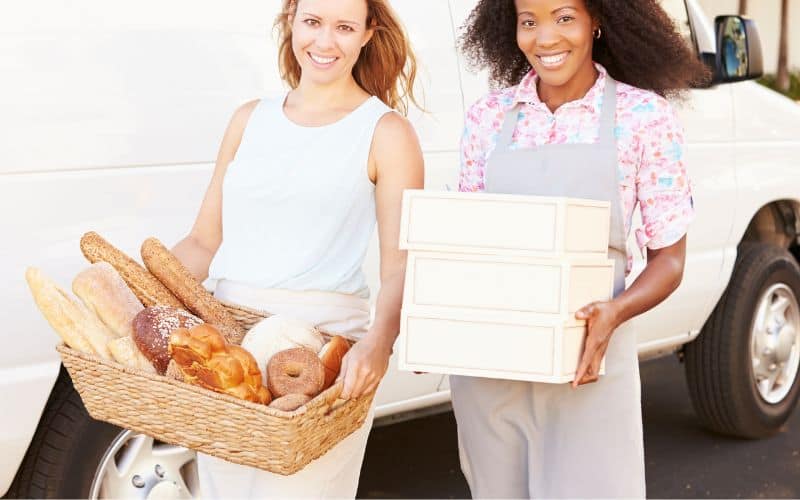
How will your baking business deliver the goods, in a literal sense?
Wedding cakes, in particular, are tricky to transport, and failing to get them there in good condition could put a dampener on someone’s big day!
You could offer collection only, of course, but this might mean you’re not competing with other local enterprises that do offer a delivery service.
10. Consider Insurance Cover
Having adequate insurance cover is a must for any small business – and it exists to protect you. What would happen if someone sued you for causing food poisoning, or if you accidentally caused damage to their home or business premises while delivering cakes?
You may need further cover if you employ anyone else, or if you want to insure the value of your equipment or stock.
11. Determine Your Niche
What are you planning to offer that will make your baked goods stand out? Should your bakery business specialize in children’s party cupcakes or have an old-school theme?
What about gluten-free bakes or vegan-friendly cakes?
If possible, hone in on a unique selling point (USP). Put yourself in the customer’s shoes. Why should they come to you, rather than anyone else?
You’ll then need to set up social media accounts that reflect your USP – while targeting the customers you want to attract.
Clear, attractive photography is absolutely critical. As is a beautiful cake that’s also delicious to eat!
You’ll also need a name. Ideally, one that reflects what you offer. It should also be fairly short, and easy to spell and remember.
12. Inform Your Mortgage Lender or Landlord
Hopefully, this will merely be a formality, but you should tell your landlord or mortgage lender that you’ll be operating your own business from the address.
In either case, permission is required.
Your landlord cannot delay or withhold permission without a good reason.
13. Establish a Local Presence

If you can exhibit your wares in the local area, then for goodness sake, seize this with both of your flour-coated hands!
Summer fetes, the school fair, and a food festival or local market could give you a chance to get your name out there. You could offer free samples here to gather – and gauge – interest.
You could also bake cakes for a local cafe for free, giving the owner and their customers a limited supply to try before they buy.
Selling Cakes From Home – FAQs
Can you sell cakes from home in the UK?
Yes, within the UK, you can indeed sell cakes you make at home. To do this regularly and on a business footing, you will need to take certain steps before doing so. This is in the interests of public health and safety.
Do I need a qualification to sell cakes in the UK?
A food hygiene certificate isn’t a legal requirement for those wishing to sell cakes in the UK from home. However, having one is highly recommended – including by the Food Standards Agency and perhaps your local council.
Can I make food at home and sell it in the UK?
If you want to sell food you’ve made at home, then you should register with your local authority, who will want to inspect the premises. You can do this for free and should do so 28 days before you begin trading.
The authority can’t refuse your registration.
Do I need to register if I sell cakes from home UK?
According to the Food Standards Agency, you do need to register as a food business with your local authority. Any food sold – even online – is covered by UK food law.
How do I start selling cakes in the UK?
There are a number of steps involved in setting up a cake business from home. This baker’s dozen can be summarised as follows:
- Check if the rules apply
- Prepare your workspace
- Get food hygiene certified
- Tell your local authority
- Learn about labelling and allergens
- Expect an environmental health inspection
- Make a HACCP plan
- Register with HMRC
- Think about delivery
- Consider insurance
- Decide on a niche
- Inform your landlord or mortgage lender
- Establish a reputation locally
A Home Food Business – Final Thoughts
Though it may seem complicated initially, the legal requirements for setting up a cake business are minimal. They’re also only in place to ensure public health and safety.
Telling your local authority and mortgage lender or landlord isn’t too time-consuming, and self-assessment as a sole trader is actually pretty simple.
Getting public liability insurance and even food hygiene certification isn’t too difficult or expensive either. Especially when you put this into the context of how much money you could make.
If you want to run a business from home that will put a smile on customers’ faces and make you a pretty penny into the bargain, making cakes could be the ideal side hustle or full-time gig.
For creative types who love to bake, surely selling cakes from home is nothing short of living the dream. Just remember to resist temptation when it comes to those goodies you’ve baked for paying customers!
